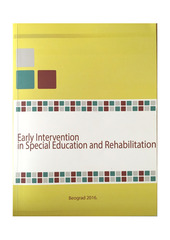Приказ основних података о документу
The effects of early rehabilitation on cognitive stability in children with spastic cerebral palsy
| dc.contributor | Radmila, Nikić | |
| dc.contributor | Ilanković, Vera | |
| dc.contributor | Nikolić, Snežana | |
| dc.creator | Vidović, Predrag | |
| dc.creator | Bošković, Mirjana | |
| dc.creator | Krstić, Nadežda | |
| dc.date.accessioned | 2022-03-02T12:31:25Z | |
| dc.date.available | 2022-03-02T12:31:25Z | |
| dc.date.issued | 2016 | |
| dc.identifier.isbn | 978-86-6203-086-3 | |
| dc.identifier.uri | http://rfasper.fasper.bg.ac.rs/handle/123456789/4192 | |
| dc.description.abstract | Aim: To examine cognitive stability in children with spastic cerebral palsy. Method: The study included 152 children with spastic cerebral palsy (CP), between ages of 6,0 and 14,6, who started habilitation treatment at the Special Hospital for Cerebral Palsy and Developmental Neurology in Belgrade before they turned one year of age. Children with epilepsy, quadriplegia and total FIQ<70, as well as with partial IQ (VIQ or PIQ) <80 were exempt from the study. Verbal IQ, performance IQ and full scale IQ were observed as target variable. The age included in WISC test, as a measure of the time elapsed from the occurrence of injury, functional status of fine and gross motor skills, the presence of visual impairment, retardation in early psychomotor development (PMD), residing at home or infirmary as an indicator of social environment were observed as potential independent variables. Results: Most of these variables showed a certain degree of relation with the WISC basic measures, especially with the FIQ and PIQ, while VIQ demonstrated independence from these factors, except being in connection with early PMD. Visual impairment and early psychomotor development proved to be a more important determinant of later cognitive ability than motor disorders. Effects of age, expressed through higher scores of FIQ in younger children than in older, were significant when the age was analyzed in combination with the status of visual perception. Social environment did not appear significantly associated with any variable. Conclusions: Considering the type of data that were available, these findings are rather seen as guidelines for future work than as unequivocal suggestion for making broader conclusions, but they certainly indicate the need for more systematic monitoring and stimulation of cognitive maturation of these children from the beginning, through the different stages of development, more specific early habilitation procedures, as well as for a greater degree of focus on the socio-psychological aspects of their maturation. | sr |
| dc.language.iso | en | sr |
| dc.publisher | University of Belgrade, Faculty of Special Education and Rehabilitation, Serbia / Univerzitet u Beogradu – Fakultet za specijalnu edukaciju i rehabilitaciju | sr |
| dc.rights | openAccess | sr |
| dc.rights.uri | https://creativecommons.org/licenses/by-sa/4.0/ | |
| dc.source | Thematic Collection of International Importance- Early Intervention in Special Education and Rehabilitation“, Beograd, Srbija, 2016. | sr |
| dc.subject | spastic cerebral palsy | sr |
| dc.subject | general intellectual ability | sr |
| dc.subject | time elapsed from the occurrence of injury | sr |
| dc.subject | visual impairment | sr |
| dc.subject | early psychomotor development | sr |
| dc.title | The effects of early rehabilitation on cognitive stability in children with spastic cerebral palsy | sr |
| dc.type | conferenceObject | sr |
| dc.rights.license | BY-SA | sr |
| dc.citation.epage | 442 | |
| dc.citation.spage | 429 | |
| dc.identifier.fulltext | http://rfasper.fasper.bg.ac.rs/bitstream/id/6332/Untitled30.pdf | |
| dc.identifier.rcub | https://hdl.handle.net/21.15107/rcub_rfasper_4192 | |
| dc.type.version | publishedVersion | sr |


